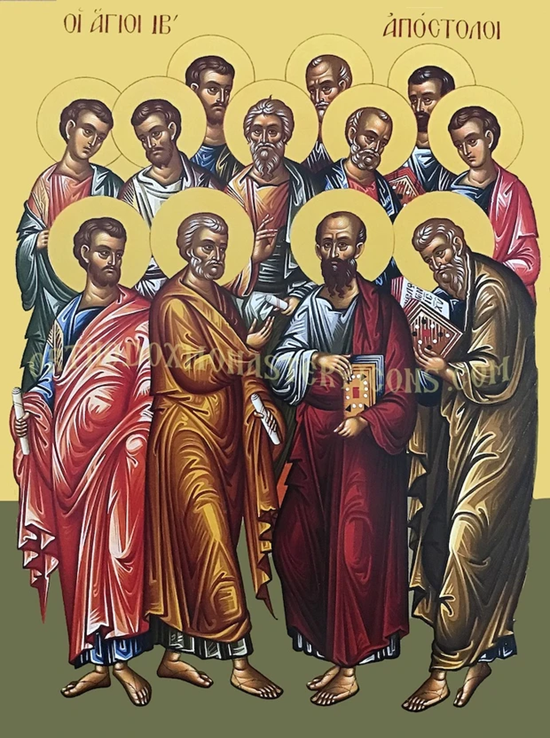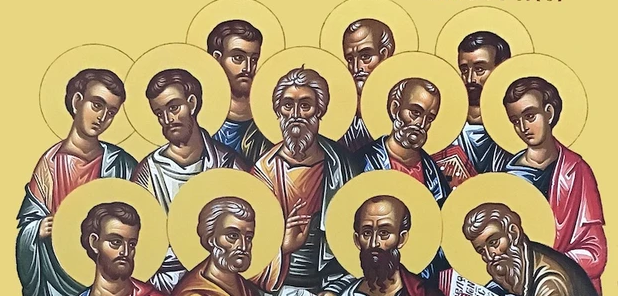Repent and Believe
Fifteenth Sunday Scripture Readings

Today’s gospel hides within it a fearsome message. It’s not obvious to the casual reader, and most people miss it entirely. Don’t think that the mission of the Twelve is obvious. It’s not. In this gospel passage, Jesus gathers together the Twelve and sends them out to preach and heal. Up until now, the Twelve had merely been observers of Jesus’s work. Now, he gives them a share in it. He gives them a share in his mission and, as such, they become, for the first time, missionaries. We have twenty centuries of missionary activity behind us, so we who are reading this gospel think we have a good idea of what a missionary is and what a missionary does. The word “mission” comes from the Latin verb, to send, so, evidently, a missionary is someone sent to do a job.
The gospel tells us what these first Christian missionaries did. “They went off and preached repentance, … drove out many demons, and they anointed with oil many who were sick and cured them.” Because this is what the Twelve did, we can assume that they were fulfilling Jesus’s instructions. They preached repentance. Isn’t this how Jesus began his own public ministry? Wasn’t his first message, according to Saint Matthew, “Repent for the Kingdom of God is at hand”? [Matthew 3:2] Or, in Mark’s version, “Repent and believe in the gospel”? [Mark 1:15] Evidently, the gospel—the good news—is that the Kingdom (or reign) of God is at hand. The Lord’s prayer tells us what the reign of God looks like when we pray, “Thy Kingdom come, thy will be done.” The reign of God breaks into human history when our human wills align with God’s. The reign of God is at hand because it has always been at hand and always will be. When the reign of God comes near, it’s not God who moves, but we who come to align our wills with his.
The message that Jesus preached, the message that the Twelve were sent to preach, and the message given to us to bring to the world is therefore, “Repent and believe that the will of God is upon us.” That’s how the reign of God comes—we embrace it by our repentance. Yet, repentance in this case doesn’t mean being sorry for our sins and wrongdoings. Repentance in the gospels always means metanoia—a change of mind and heart. In other words, “Repent and believe the gospel” means “Change your mind and surrender to God’s will.”
We can take this message a step further. Our human condition leaves us struggling to overcome our sense of alienation and isolation. At every crisis point—every kairos—we face the same moral dilemma: what is the right thing—the best thing—to do? Morality in theory leaves us thrashing. We want a morality that works in practice. As we grow, our moral practice matures. We start out simply seeking pleasure and avoiding pain. But this brings us into conflict with others. Our pleasure can cause others pain. So, we seek instructions on how to live together in harmony with others and with God. We create a world of rules and regulations, duties and obligations to guide our interactions. Yet, as the Jewish people learned over the course of their long history, laws and regulations, duties and obligations soon become burdensome, and, because a legalistic approach can never cover every situation, it often leads to senseless actions simply because the law demands it.
In Jesus’s time, the people believed that they could win God’s favor and overcome their alienation and isolation by strict adherence to the law. They thought salvation came through “good behavior” and good behavior was defined by something outside of themselves—by the Torah, by the Pharisees, by the rabbis, by the Church. People then and now believed that they could behave their way into heaven. Jesus rejected that concept. He showed how spiritually and morally bankrupt blind obedience can be. He fulfilled the law and revealed the law of love by breaking the Law of Moses.
Repentance, then, has nothing to do with law-breaking or so-called “sinning” against a set of commandments. Repentance, for Jesus, means leaving that formalistic type of religion behind. We’ve heard Jesus say, “I give you a new commandment, love one another as I have loved you.” [John 13:34] This isn’t some sort of nebulous touchy-feely kind of love. This is the love of the cross and resurrection. Christ challenges us to adopt a new and higher morality where self-abandonment for the sake of others is the new norm. To repent—to change our minds—means to let go of the illusion that we can overcome alienation and isolation merely by doing or not doing things. What matters is the commitment of our deepest selves to the task.
The Twelve were sent out to tell the world that the will of God truly is at hand. Joining our will with the will of the Father in self-sacrificing love brings the reign of God near. It is nothing less than our adoption as daughters and sons of God as described in our second reading. In this, we are grafted onto the life and love of the Trinity itself. Living life as Christ commanded is scary as hell because there are no limits, no dos or don’ts, no guidelines or norms to follow. There are no guardrails to keep us on the path. In fact, as Saint John of the Cross once wrote, “Beyond this point, there is no path.” The only way forward in the spiritual life is the way Jesus took: to love with all our hearts and souls and minds and strength, regardless of the cost. If we are to be missionaries sent like the Twelve to preach and heal, this repentance—this change of mind and heart—must be our good news, our gospel.
Get articles from H. Les Brown delivered to your email inbox.
